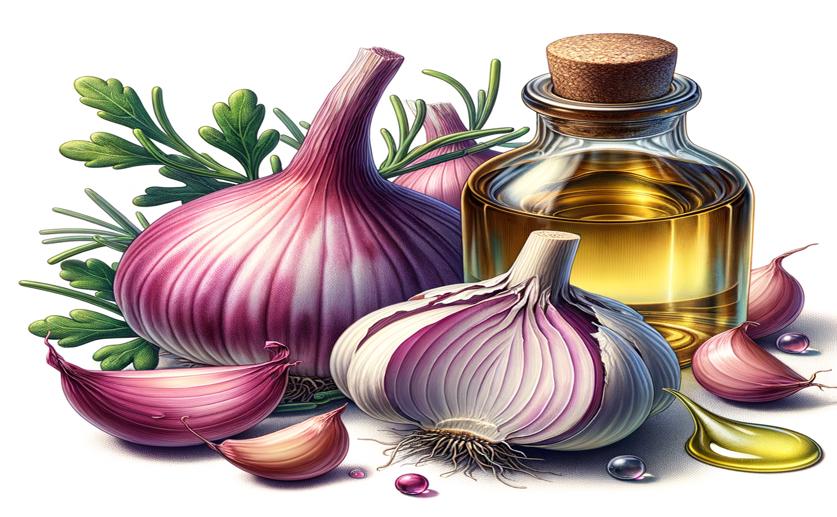Garlic and Onion Extracts Fight Parasites and Boost Immunity in Fish

Image Source: Natural Science News, 2024
Key Findings
- The study by Zagazig University explored using garlic and onion extracts to treat parasitic infections in Nile tilapia
- Garlic and onion extracts improved the health and immune response of infected fish, reducing the impact of the parasites
- Treated fish showed better gill tissue regeneration compared to untreated infected fish, indicating a positive therapeutic effect
Gill monogenean infestation is a significant issue in aquaculture, causing respiratory problems and high mortality rates in cultured fishes. Recent research conducted by Zagazig University aimed to explore the use of natural plant extracts, specifically garlic (Allium sativum) and onion (Allium cepa), as water treatments to mitigate these parasitic infections in Nile tilapia (Oreochromis niloticus L.)[1]. This study builds on previous findings that emphasize the importance of medicinal plants in aquaculture due to their nutritional, therapeutic, and antimicrobial properties[2].
The study was designed to evaluate the effects of garlic and onion extracts on the hematological profile, innate immunity, immune cytokines expression, and histopathological features of the gills of Nile tilapia infected with gill monogenean trematodes (Dactylogyrus sp.). The 96-hour lethal concentration 50 (96 h-LC50) of garlic extract (GE) and onion extract (OE) were determined to be 0.4 g/L and 3.54 g/L, respectively. The in-vitro anti-parasitic potential of GE ranged from 0.02 to 0.18 mg/mL, while for OE, it ranged from 0.4 to 1.8 mg/mL.
In the therapeutic trial, 120 fish were randomly distributed into four groups, each with three replicates. Group 1 (G1) served as the control and was neither infected nor treated. Group 2 (G2) was infected with Dactylogyrus spp. but not treated. Groups 3 and 4 (G3, G4) were infected and treated with 1/10 and 1/5 of the 96 h LC50 of OE, respectively. Groups 5 and 6 (G5, G6) were infected and treated with 1/10 and 1/5 of the 96 h LC50 of GE, respectively.
The results showed that the control group exhibited no apparent signs or behavioral changes, while the infected group displayed clinical signs such as pale color and damaged tissue. Dactylogyrus spp. infection significantly lowered hematological and immunological variables, including hemoglobin (HB), mean corpuscular hemoglobin (MCH), mean corpuscular hemoglobin concentration (MCHC), and white blood cells (WBCs). Immunological markers such as lysozyme, nitric oxide, serum anti-protease activities, and complement 3 were also reduced. The expression of cytokine genes IL-1β and TNF-α, which are involved in inflammation, was modulated and improved by treatment with garlic and onion extracts.
Histopathological examination of the gills revealed hyperplasia leading to the fusion of the gill filament, lifting of epithelial tissue, aneurism, and edema in the infected fish. However, groups treated with garlic and onion extracts showed more regenerated epithelium compared to the control group, indicating a positive therapeutic effect.
These findings are consistent with earlier studies that have highlighted the influence of environmental factors on parasite biodiversity and infection rates in aquaculture[3][4]. For instance, a study conducted in Paraná, Brazil, found that abiotic and biotic factors significantly influence the rate of monogenean parasitism in Nile tilapia, with higher parasitic indices observed in colder seasons[3]. Another study in Mexico demonstrated a positive correlation between the presence of monogeneans and water quality parameters such as nitrites and ammonium levels[4].
The current study by Zagazig University expands on these findings by demonstrating that natural plant extracts like garlic and onion can effectively enhance the health and immune response of Nile tilapia, thereby reducing the impact of parasitic infections. This approach not only offers a sustainable alternative to chemical treatments but also aligns with the growing emphasis on utilizing natural products in aquaculture to improve the quality of aquatic organisms while mitigating environmental damage[2].
In summary, the use of garlic and onion extracts presents a promising natural solution to manage gill monogenean infestations in Nile tilapia. This study provides a foundation for further research into the application of medicinal plants in aquaculture, potentially leading to more sustainable and effective fish farming practices.
MedicineBiochemAnimal Science
References
Main Study
1) Anti-parasitic activity of garlic (Allium sativum) and onion (Allium cepa) extracts against Dactylogyrus spp. (Monogenean) in Nile tilapia (Oreochromis niloticus): Hematology, immune response, histopathological investigation, and inflammatory cytokine genes of gills.
Published 26th July, 2024
https://doi.org/10.1186/s12917-024-04187-5
Related Studies
4) Physicochemical Water Quality Influence on the Parasite Biodiversity in Juvenile Tilapia (Oreochromis spp.) Farmed at Valle Del Mezquital in the Central-Eastern Socioeconomic Region of Mexico.
https://doi.org/10.3390/pathogens11101076
Related Articles





 20th June, 2024 | Jenn Hoskins
20th June, 2024 | Jenn Hoskins